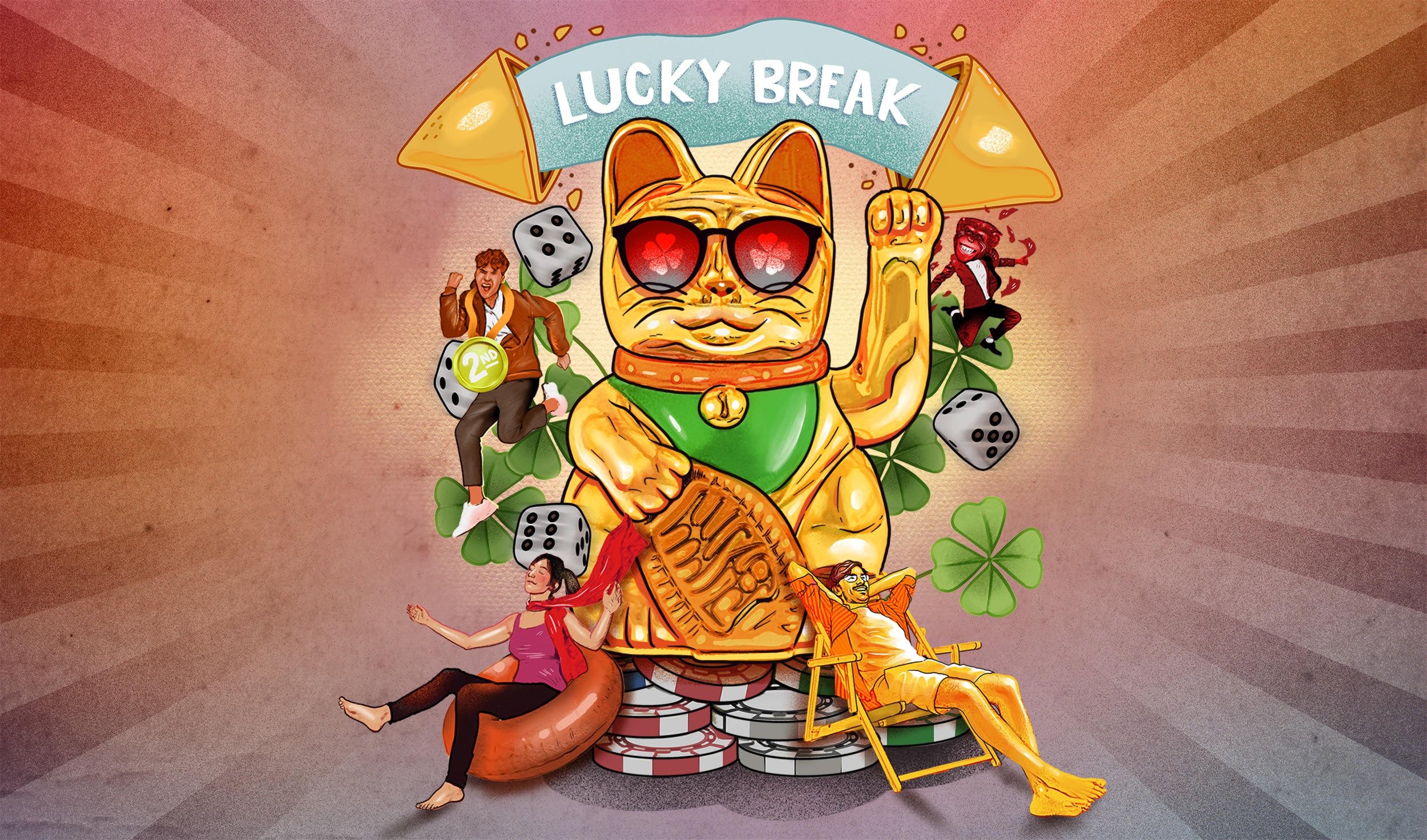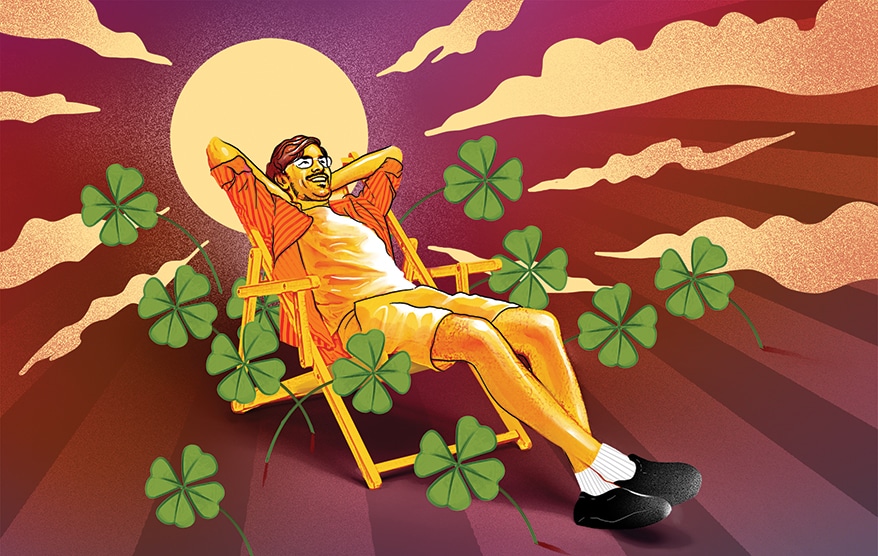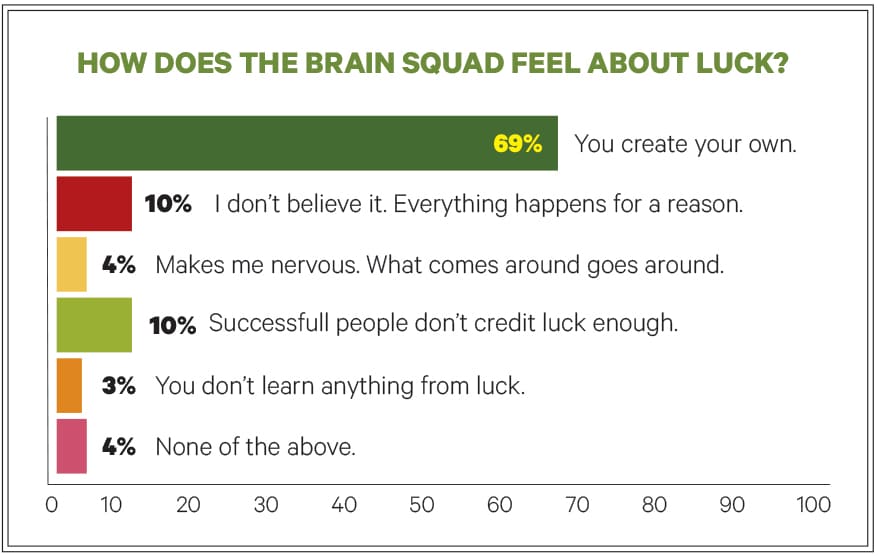
24 Ways to Create Your Own Luck in the Print Business
The concept of “good luck” is often derided, but with a few tweaks to the way you run your shop, you may find yourself the recipient of it.
Published
2 years agoon
LET’S GET THIS out of the way – much of your success in business has been down to luck. Yes, it’s a little unpalatable but true. And the more successful you’ve been, the luckier you’ve been. Wait! Don’t toss this month’s issue of Big Picture aside. This success-luck thing required some preconditions – you’re also skilled at what you do, and likely very hardworking.

Brian Adam of Olympus Group gets it: “Luck is a result of preparation and work. You get ‘lucky’ in our industry by building a great team, marketing your business, and going after lots and lots of opportunities.”
The Nobel Prize-winning behavioral economist Daniel Kahneman summed up this secret to professional success in what he has called his favorite formula:
Success = talent + luck
Great success = a little more talent + a lot of luck
The work of Kahneman, who is best known for his studies into cognitive biases, backs up much other research that suggests we humans drastically undervalue the influence of luck in many situations, and overvalue it in others. It has to do with something psychologists refer to as the “locus of control,” or how much you think you control the events happening around you. Most people have an internal locus when it comes to good things – they take credit for their success – but an external locus when things go wrong.
This is not just a robust ego at work. It’s also down to the “availability heuristic,” the bias whereby we attach more significance to things that are easier to call to mind. It’s not hard to recall the countless times when you put in the effort to succeed: slogging through 14-hour days during the holiday season, preparing reams of documents for loan interviews, the drama of managing an unruly staff. By contrast, it’s genuinely difficult to perceive the ways you may have been fortunate: to open or expand a business at a time of historically low interest rates, to benefit from a global shift in taste toward customization/the humanization trend in animals, to ride the back of 12 years of unbroken economic growth … In truth, we control much less than we like to believe.
Advertisement
There are reasons most business owners and managers don’t usually want to talk about the role of luck in their success. It’s not just that it takes some of the shine off their accomplishments, but because in the purest, blindest sense, luck is random and thus boring. If it’s out of your control, why bother?
To be sure, there is a certain type of luck – dumb luck, winning-the-lottery luck – that is not worth giving much thought to. But the other kinds – the luck you provoke, the fortunes and misfortunes you prepare for, the luck that can be tapped through an understanding of probability, that luck that comes from hard work or your serendipitous networking – when fostered, can give your business a huge boost.
It’s this disconnect between skill and luck that is sometimes the hardest to understand. Counterintuitively, the more competitive and skilled the players in a marketplace or other segment in life, the more luck you need.
Consider the 50 companies featured in three of the most popular business bestsellers of the past 40 years: In Search of Excellence, Good to Great, and the unfortunately named Built To Last. Of the 50, 16 failed within five years after the books were published, and 23 became mediocre as they underperformed the S&P 500. It wasn’t because their managers or workers stopped trying or innovating. It was because things even out. If you get an extreme result in one period, the next result will probably drift toward the average. Statisticians call it “regression to mean.” Normal people might just say their luck ran out.
All this is not to imply that you are helpless before fate or that you should bet the coming month’s payroll on the roulette table when you’re in Vegas for ISA Sign Expo. There is still much in life you do control – and luck, while it can’t be tamed, can be influenced.
AdvertisementIn the following pages, we provide some ideas shared by your fellow wide-format PSPs, experts in this field, and from our own reading on how to improve your odds in the face of such uncertainty.

Be on the
Lookout for Luck
1 It starts with observation. “You’re not lucky because more good things are actually happening; you’re lucky because you’re alert to them when they do,” psychology writer Maria Konnikova writes in The Biggest Bluff: How I Learned To Pay Attention, Master Myself, And Win. “If we want to be successful, we need to train our powers of observation, to cultivate that attitude of mind of being constantly on the lookout for the unexpected and make a habit of examining every clue that chance presents.” Most people are simply not open to what’s around them – something that is becoming harder to cultivate in our age of constant distraction and never-ending connectivity.
Keep an Open Mind …
and Relax a Little
2 Part of the challenge is that good-luck events often reveal themselves in ambiguous, trivial ways, which can make them hard to detect. As the saying goes, “Actual great opportunities do not have ‘Great Opportunities’ in the subject line.” Thus, luck tends to favor the curious. “This is one of the most counterintuitive ideas,” says Richard Wiseman, a psychology professor at the University of Hertfordshire in the UK, and author of The Luck Factor. “We are traditionally taught to be really focused, to be really driven, to try really hard at tasks. But in the real world, you’ve got opportunities all around you. If you’re driven in one direction, you’re not going to spot the others. Unlucky people go to parties intent on finding their perfect partner and miss opportunities to make good friends. They look through newspapers determined to find certain types of job advertisements and as a result, miss other types of jobs. Lucky people are more relaxed and open, and therefore see what is there rather than just what they are looking for.”
Hit the Books
3 Entrepreneurially lucky people who regularly question the norm and seek continuous improvements in their business and in themselves end up being luckier because they want to learn, says Anthony Tjan, author of Heart, Smarts, Guts, And Luck. “They read new things, try new experiences, and are open-minded to a variety of relationships because they are curious. All of these things increase the probability for circumstantial luck … You will simply see more – and therefore increase your chances of finding luck – if you adopt the mindset ‘there is always more to see and more to learn.’”

Don’t Be Too
Quick to Judge
4 To be lucky, you want to change your relationship with ideas, says Stanford engineering school professor Tina Seelig. “Most people look at new ideas that come their way and they judge them: ‘That‘s a great idea’ or ‘That‘s a terrible idea.’ But it‘s actually much more nuanced. Ideas are neither good nor bad. And in fact, the seeds of terrible ideas are often something truly remarkable,” she says in her widely viewed TED talk on luck. “You look around at the companies, the ventures that are really innovative, the ones that we now take for granted that have changed our lives, well, you know what? They all started out as crazy ideas, ideas that when pitched to other people, most people said, ‘That’s crazy, it will never work.’’’
Squeeze Those Lemons
5 According to Wiseman, lucky people are certain the future will be bright. That expectation becomes a self-fulfilling prophecy because it helps them persist in the face of failure and positively shapes their interactions with other people. When things go awry, they ‘‘turn bad luck into good’’ by seeing how they can squeeze some benefit from the misfortune. Asked how they’d react to being shot in the arm, according to Wiseman, they typically reply, “Well, I’d be relieved I wasn’t shot in the head. Maybe I can sell my story to the media.” Psychologists refer to this ability to imagine what might have happened, rather than what actually did happen, as “counterfactual.” In doing this, such people feel better about themselves and their lives. This, in turn, helps keep their expectations about the future high, and increases the likelihood of them continuing to live a “lucky life.”
These two PSPs found good luck through horrible situations like 9/11 and Hurricane Katrina: “Days after 9/11 happened, I was on a call on my way to work. As a friend was sharing that he knew of someone who had 100,000 car flags, a man rode by on a bike with an American flag bandana,” says Carmen Rad of CR&A Custom. “I told my friend to fax the order and reserve all the flags. I did not have a buyer nor the money to purchase. In one day, I sold all the car flags to one client and asked for upfront payment. The client agreed to pay for the whole order including the shipping. That was luck.”
Think of Yourself
as the “Almost-Victor”
6 When bad luck strikes, Konnikova recommends thinking of yourself as an “almost-victor” – someone who thought correctly and did everything possible in terms of the things you could control but was foiled by fate’s cruel hand. “No matter: You will have other opportunities, and if you keep thinking correctly, eventually it will even out. These are the seeds of resilience, of being able to overcome the bad beats that you can’t avoid and mentally position yourself to be prepared for the next time,” she writes in The Big Bluff. “People share things with you: If you’ve lost your job, your social network thinks of you when new jobs come up; if you’re recently divorced or separated or bereaved, and someone single who may be a good match pops up, you’re top of mind. This attitude is what I think of as a luck amplifier.”
Just Don’t Play
the Victim
7 In contrast, seeing yourself as a victim will serve more as a luck dampener, says Konnikova: “Because you’re wallowing in your misfortune, you fail to see the things you could be doing to overcome it. Potential opportunities pass you by; people get tired of hearing you complain, so your social network of support and opportunities also dwindles; you don’t even attempt certain activities because you think, ‘I’ll lose anyway, why try?’; your mental health suffers; and the spiral continues,” she says. To be sure, these perspective-shifting tricks like counterfactuals won’t solve all your issues in one fell swoop. But they can provide breathing space, a little room for maneuver – and some days that’s all you need.
“Luck = opportunity meets readiness,” says Jared Smith of bluemedia. “One of our now larger clients of 10 years came to us as Hurricane Katrina caused a conference to move to our area so they reached out to us for local help and have been a client ever since. We were ‘lucky’ because we were ‘ready’ to deliver at a high level. We could seize the opportunity.’’ — Jared Smith, Bluemedia

View Life as a
Flow of Luck Events
8 “It helps to view life as a river in which lucky events – good and bad – will flow your way. It’s neither good nor bad. It just is,” writes Morten T. Hansen, co-author of Great by Choice, in a blog on the Harvard Business Review website. “When you start having this ‘luck flow’ mindset, you can start managing those events to your advantage, but only then.” This view recalls the Stoic approach to life that has been popularized in recent years: It’s not the events that happen in life, but our reaction to them that matters.
“I don’t consider luck a factor in life, but I do believe in miracles and the power of faith and prayer,” says Kristin Lanzarone, WrapStar Pro. “In 2020, right before the pandemic hit, I was close to throwing in the towel because I couldn’t keep a steady pace with fleet accounts. Mind you, most of my business is word of mouth. One morning at the shop, I prayed that soon I could get my first large fleet job to be able to continue doing the work I love. Literally within the hour after my prayer, the phone rang from one of my growing customers. They had 12 new vehicles ready to be wrapped: eight vans, four sedans, all of them three-quarter wraps. I was able to get them all done in five days, at a rate of 2.4 cars a day, solo. To this date, we have completed more than 30 vehicles for them and have another 30 arriving soon from the manufacturer. As I always say, trust the timing.”
Keep a Luck Diary
… or Spreadsheet
9 To build these positive skills, Wiseman recommends keeping a “luck diary.’’ At the end of each day, spend a couple moments writing down the lucky things that happened. “We ask them not to write down the unlucky stuff. After doing that for a month, it’s difficult not to be thinking about the good things that are happening.” If you want to take it to the next level, do something professional poker players do: Create a spreadsheet. Each time something happens, jot it down in a “situation trigger” column. In the next column, write a description of your thoughts, emotional reactions, and how you subsequently behaved. Next column, give your best assessment of what was the underlying flaw, and finally, write a “logic statement” you can use to inject some rationality the next time you’re faced with a turn in luck.

Feel Lucky Through
Some Simple Subtraction
10 Don’t want to keep a diary? The Journal of Personality and Social Psychology suggests this exercise in simple subtraction, which is a bit like the pivotal scene in “It’s a Wonderful Life.” Think about the positives in your life – your family, your business, your community, your health. Then start thinking about all the small events that had to take place for you to get to this point: What if your father hadn’t taken that summer job and met your mother, what if your great grandfather hadn’t opted to try his luck in America, what if penicillin hadn’t been invented … and so it goes. What this does, according to the paper, is deepen your appreciation for what is happening in your life at this moment. It allows you to count your blessings.
“Luck and the opposite are a part of life,” says Morgen Masciana of DCG One. “You can shape how these occurrences affect you and, in return, how you and the people around you bounce off that reaction. I specifically remember my first sign shop job. I was hired over the other more experienced applicant because I didn’t have perfume on. The other applicant had cologne on and had more experience, but I got hired anyway. That is how I started my career in signs. Would I have been hired if the other applicant didn’t wear cologne that day? What if I had worn perfume? Who knows, but I’ve used that experience to be more considerate of others in an office environment and I’ve got to feel it’s been a small part of my success.”
Be Prepared to Act
11 One of the most often-cited quotes about luck comes from Louis Pasteur: “Chance favors the prepared mind.” The actual statement was a little different: “Where observation is concerned, chance favors only the prepared mind.” It’s not enough just to spot a good-luck event; you need to be prepared to alter your plans to act on it.
When faced with a luck opportunity, Hansen recommends doing what a lot of the best corporate leaders do: Apply the “zoom out, then zoom in” principle. When confronted with a luck event, small or large, take a moment to zoom out (“What are we really trying to accomplish here?”), then zoom in (get the details right). Similarly, prudent leaders prepare for that unexpected event that comes out of nowhere. (Had you honestly heard of Wuhan before 2019?) Prepare for bad-luck events by incorporating safety margins (take an earlier flight to that tradeshow; add two extra days to your next deadline), acquire options (line up that backup supplier), and invest in a strong network of people who will help when things go bad.
Confidence and honesty build trust. Be prepared when opportunity presents itself. A chance meeting that results in a business relationship may seem random or lucky, but without persistence, preparation, confidence, and trust, it would not have resulted in much or been ‘lucky.’’’ — Brian Hite, Image Options
Take Risks – Fortune
Favors the Brave
12 “You gotta be in it to win it” is a better example of great advertising than applied math, but it is accurate: Even winning the lottery – the ultimate example of dumb luck – requires you to go out and buy a ticket, or at least open your phone. Taking action releases energy, and luck typically requires a catalyst and at least a small risk. As the salesperson’s creed goes, every time you don’t ask, the answer is no.
Good luck also has a multiplier effect. Opportunities lead to opportunities. Recounting a publishing deal that started with a hello to the stranger on a plane and ended with a book that sold a million copies, Seelig says, “Now, you might say, ‘Oh, you’re so lucky.’ Of course I was lucky, but that luck resulted from a series of small risks I took, starting with saying hello. And anyone can do this, no matter where you are in your life, no matter where you are in the world – you can do this by taking little risks that get you out of your comfort zone. You start building a sail to capture luck.” And let’s not forget that not doing something is also a choice. “There’s a false sense of security in passivity. You think that you can’t get into too much trouble – but really, every passive decision leads to a slow but steady loss … Hanging back only seems like an easy solution. In truth, it can be the seed of far bigger problems,” writes Konnikova.
Kim Magraw of Vivid Sign says, “Luck is created when you have planted a seed, like a farmer hoping for a good crop. Sometimes good weather, good sun, good rain means a good crop. Same concept, I have planted a seed that will return to me in what may seem like luck, but it was planted well in advance. When you think it’s good luck, you need to work it hard and take advantage of the situation. This again replants the new seed. One year, I got a call on a Sunday morning from a source at Nike about a football game in Dallas. I lived in Seattle. He asked, ‘Can you get to Dallas tomorrow? I might have a project.’ My answer: ‘Let me get a flight. See you there.’ I was there and was provided a $115,000 project for a one-game sponsorship, up and down in seven days. I felt like I was so lucky.”
Be a Dentist
13 Michael Mauboussin writes in The Success Equation that the closest you can come to making your own luck is to work in a field where the variation in skills remains wide – which, by and large, means new industries or segments rather than established ones. Keep in mind though that wherever luck is powerful, short-term outcomes will be poor indicators of whether you’re on the right track. At the same time, some fields such as startups, product launches, academia, and creative efforts like jewelry design are by their nature riskier. Nassim Nicholas Taleb argues that $1 million earned as a dentist is not the same as $1 million earned as a rockstar because success as an artist depends much more on chance. If you imagine a game of “career roulette,” you end up a starving artist 99 times for every time you end up a rockstar. If you want to minimize the chance of bad luck, he says, be a dentist. There are no “starving dentists.”
Or Be Contrarian
14 Given the skewed payoffs in such a world, it is possible to achieve outsized success by being contrarian. When the economist John Kay examined the forecasting record of his peers in the 1990s, he noted that Patrick Minford, an idiosyncratic forecaster, would often produce the best forecast one year and the worst one the next. If the consensus is wrong, being an outlier gives you a high chance both of dramatic success and spectacular failure.
Provoke Luck
15 The core strategy of anyone looking to enhance their luck is to expose yourself to as much randomness and “good uncertainty” as you can. Break your daily routines, take a different route to work, go to a party with the goal of only talking to people wearing red, attend conferences no one else in your field is attending, read books and blogs no one else is reading. “Although it may seem strange, under certain circumstances, this type of behavior will actually increase the amount of chance opportunities in people’s lives,” says Wiseman. It’s like living in an orchard, he says. Keep going back to the same trees and soon you’ll harvest no apples. “It’s easy for people to exhaust the opportunities in their life. Keep on talking to the same people in the same way. Keep taking the same route to and from work. Keep going to the same places on vacation. But new or even random experiences introduce the potential for new opportunities.”

Create Your Own
Chaos Monkey
16 A decade ago, software engineers at Netflix created Chaos Monkey, a system that randomly disables Netflix servers. The idea was to push the company’s engineers to think more broadly and build more resilient systems. Like Lockheed Martin’s Skunk Works program that freed some designers to pursue ideas that were sometimes at odds with what the main company was working on, Chaos Monkey showed a recognition that while the conventional gradual evolutionary approach to design will eventually yield results, throwing a wrench in the works can help you find a way that leapfrogs you into the future. Add some randomness to your systems to see what happens.
Build a Lucky Network
17 Studies show the people who can help you the most in business often aren’t those closest to you – they are the secondary contacts, the friend of a friend, the associate of a key client, or some other person you know only tangentially. The reason is twofold: A secondary contact has nothing much invested in recommending you to someone else (the old saying about not letting business and friends mix) and because this person is not from your inner circle, they expose you to a wider network based on interests or connections you don’t have. Your hairdresser’s son, for example, may be the person to build your website. Tjan says the best way to practice what he calls “serendipitous networking” is to be open and authentically interested in people. “A Lucky Network is not something that can be premeditated. It is not a targeted list of must-have relationships, but rather it is a set of relationships built out of curiosity and friendship that somehow ends up encompassing people who turn out to be pivotal. In our research, 86 percent of the luck-dominant credit a key part of their success to an ‘openness to new things and people,’” he writes in an HBR blog.
“Luck comes from frequency and activity,” says Rick Mandel of Mandel Graphic Solutions. “There are times you are lucky with timing and an opportunity. If you’re networking or faithfully making calls, opportunities that may be luck will happen more often. You have to then take advantage of it. I had a mentor tell me that you need to stay liquid in cash to take advantage of that one opportunity that will come by.”
Learning from Luck
18 In nearly all luck events, there are elements you did control, ways you reacted that could have been handled differently, things you can learn to do better next time. If you keep making the same mistakes, that’s not bad luck – it’s a failure to learn. Conversely, when things are going well, it’s a good idea to test whether your success is entirely the result of wise decision-making or due in some part to good fortune. “One of the things about good luck if you’re not careful is that it can go to your head,” says Konnikova. “Because when you’re winning, it’s just too easy not to stop and analyze your process. Why bother if things are going well? When it comes to learning, Triumph is the real foe; it’s Disaster that’s your teacher. It’s Disaster that brings objectivity. It’s Disaster that’s the antidote to the greatest of delusions, overconfidence,” she writes, paraphrasing poet Rudyard Kipling. The most dangerous situations are when people believe they have attained a certain control over luck, she says, citing studies of investors. “The more people overestimate their own skill relative to luck, the less they learned from what the environment was trying to tell them, and the worse their decisions became: The participants grew increasingly less likely to switch to winning stocks, instead doubling down on losers or gravitating entirely toward bonds.”

Focus on the Process,
Reward the Effort
19 To some bosses, the only thing that matters when it comes to the contributions of their workers is the outcome, not how they got there. Economists refer to it as the “tournament” approach, based on the idea that the only thing that matters for a player in, say, the US Open, is that they’re holding up the trophy (and the winner’s check) at the end. Degree of effort, style, boldness, initiative … none of that is of consequence. But in business, outcomes aren’t always in your control. So, it’s better to set targets and a system that rewards effort, innovation, and prudent risk-taking. Focus more on the process and not solely on the results. To do otherwise is to create an overly conservative environment where people don’t dare make a mistake. ‘‘Consider the psychic costs of coming up short in a philosophical system that disclaims the role of luck, timing, or competition, and admits no obstacles that cannot be conquered by the sheer application of will,” the educator Steve Salerno writes in his book Sham.
Luck Is Not a Strategy
20 Luck and hope have a complicated relationship. As a business strategy, you never want to rely on good fortune. Lady Luck is capricious at the best of times. Having said that, it’s actually good for your salespeople, especially the younger ones, to believe in luck – not dumb luck but the kind that comes from getting out there and provoking it. “The greater a salesperson’s belief that success is a combination of luck and effort and that good luck will come along sooner or later, the greater their sales activities, such as making phone calls, meeting prospects, qualifying prospects, and gathering intelligence about prospects and competitors. And ultimately the higher their performance,” writes marketing professor Joël Le Bon in a Harvard Business Review Online article. He says the salespeople he has studied attributed 60 percent of their sales to luck.
“Many opportunities have crossed the paths of every person on the planet, but have you been prepared enough to seize it?” asks Tim Bezner of Westmount Signs and Printing. “How many times have you declined to bid on a job? How many times have you declined a run in local politics? How many times have you been too afraid to ask someone out on a date? Sometimes there is bad luck such as a forest fire or a pandemic, but did you have a business continuity plan in place? In the event of a solar flare, can you operate your business without the internet? What level of preparation are you comfortable investing in?”
Listen to Your
Lucky Hunches
21 Gut is another tricky one. Intuition can help, but your emotions aren’t always your friend when it comes to making decisions. Wiseman argues lucky people make effective decisions by listening to their intuition and gut feelings. They also take steps to actively boost their intuitive abilities – for example, by meditating and clearing their mind of other thoughts. “You don’t want to broadly say that whenever you get an intuitive feeling, it’s right and you should go with it. But you could be missing out on a massive fount of knowledge you’ve built up over the years. We are amazingly good at detecting patterns. That’s what our brains are set up to do,” Wiseman says.
See the World
Probabilistically
22 For gamblers, life is about probability. Yes, luck may rule their world, but they thrive when they can narrow the odds. Such an approach means not expecting you’re due anything – “good karma, good health, money, love, or whatever else it is,” says Konnikova. Probability has no memory. Because a coin-toss comes up heads three times in a row has no bearing on the fourth toss. But it’s something most people struggle with. “It’s called the ‘description-experience gap.’ In study after study, people fail to internalize numeric rules, making decisions based on ‘what feels right’ rather than based on the data they are shown. We need to train ourselves to see the world in a probabilistic light.” For all the benefits of taking a positive approach to things, you’re still better off being the favorite rather than the underdog. In the battle between Walmart and the plucky independent, the big box invariably wins. When people get into trouble taking life or career bets, it’s often because they didn’t understand the risks. Don’t try crossing the road blindfolded.
Run Experiments
23 What the venture capitalists of Silicon Valley figured out early was the rewards of luck are huge, money is often made from things you weren’t even looking for, and you don’t have to bet the house. Top VC firms will typically invest in 20 startups with the expectation only one or two will prosper. But you don’t need to have a billion dollars behind you to take such an approach – any modest and reversible experiment counts, says Tim Harford, the author of Freakonomics. Writing in the Financial Times, he says: “An experimental thinker views the uncertainties of the world as something to be resolved through tentative trial and error.” Try something modest, he says; “an experiment doesn’t need to be a double-blind, randomized controlled trial to yield useful information. If it works, do more of it. Many of the decisions we make are reversible. Only our stubbornness makes them permanent.”

Close the Loop
24 Showing gratitude has a close relationship with luck, says Seelig, an understanding she has instituted into daily practice. “At the end of every single day, I look at my calendar and review all the people I met with, and I send thank-you notes to every single person. It only takes a few minutes, but at the end of every day, I feel incredibly grateful and appreciative, and I promise you it has increased my luck. You need to understand that everyone who helps you on your journey is playing a huge role in getting you to your goals. And if you don’t show appreciation, not only are you not closing the loop, but you’re missing an opportunity. When someone does something for you, they’re taking that time that they could be spending on themselves or someone else, and you need to acknowledge what they’re doing.”

SPONSORED VIDEO
Printvinyl Scored Print Media
New Printvinyl Scored wide-format print media features an easy-to-remove scored liner for creating decals, product stickers, packaging labels, and more. The precision-scored liner, with a 1.25” spacing on a 60” roll, guarantees a seamless and hassle-free removal process.
You may like
Advertisement

Check Out the Great Info in the July/August Issue

National Workaholics Day, Interns Day, and More July/August Dates for Print Pros

Kill an Obsolete Project, Survey Competitor’s Websites, and More To-Dos for July/August
SUBSCRIBE

Bulletins
Get the most important news and business ideas from Big Picture magazine’s news bulletin.
Advertisement
Advertisement
Most Popular
-

 VEHICLE WRAPS + GRAPHICS3 weeks ago
VEHICLE WRAPS + GRAPHICS3 weeks agoAs the Wrap Market Surges, Technology Keeps Improving
-

 Press Releases3 weeks ago
Press Releases3 weeks agoMUTOH Wins 2024 EDP Award “Direct to Shape Printer” for Its XpertJet 1462UF
-

 Case Studies3 weeks ago
Case Studies3 weeks agoAt This Pennsylvania Printer, Color Consistency is King
-

 Case Studies1 week ago
Case Studies1 week agoFormer Frito Lay Delivery Van Becomes an Eye-Catching Catering Vehicle
-

 Benchmarks3 weeks ago
Benchmarks3 weeks ago3 Food Truck Wraps Where Skilled Designers Overcame Tough Technical Challenges
-

 Press Releases2 months ago
Press Releases2 months agoAvery Dennison Sponsors 2024 Design-a-Bus-Wrap Student Art Contest
-

 Press Releases3 weeks ago
Press Releases3 weeks agoPRINTING United Alliance Announces 2024 Pinnacle Award Winners
-

 Press Releases2 months ago
Press Releases2 months agoKonica Minolta’s AccurioJet KM-1e Shines at 2024 In-Print Awards















